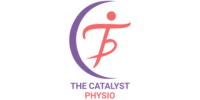Introduction
In the hustle and bustle of modern life, maintaining optimal health has become a priority for many individuals. Home physiotherapy has emerged as a popular and effective way to stay fit, offering convenience, personalized care, and cost-effectiveness. In this comprehensive guide, we will delve into the realm of effective home physiotherapy exercises, providing insights, tips, and real-life success stories to inspire and guide you on your journey to wellness.
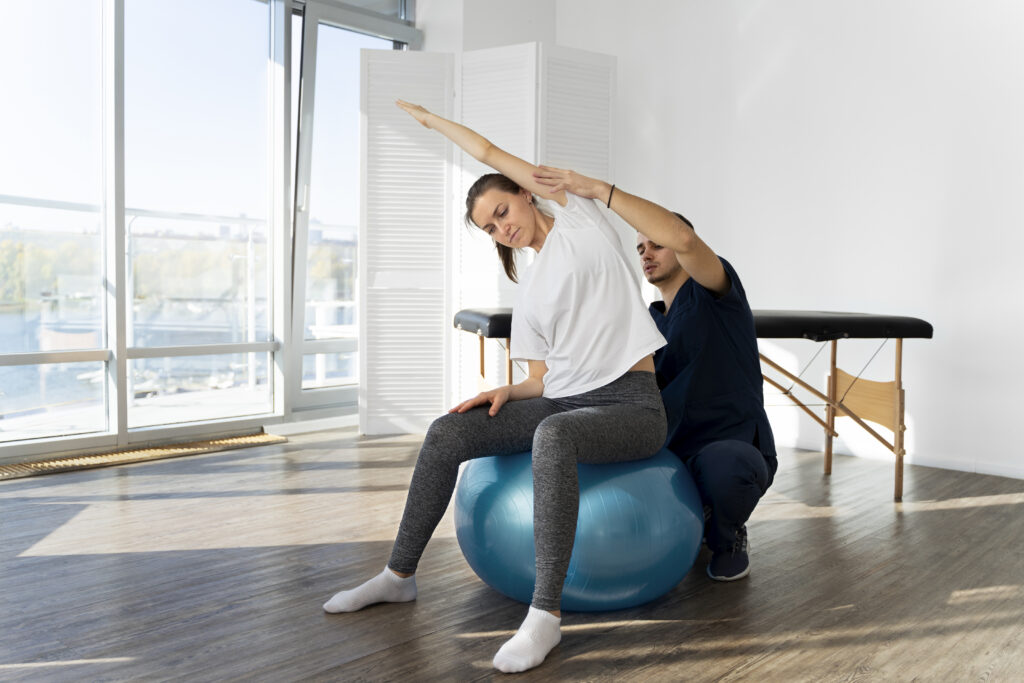
Importance of Home Physiotherapy
Convenience and cost-effectiveness
Home physiotherapy stands out for its flexibility, allowing individuals to exercise at their own pace and within the comfort of their homes. It eliminates the need for costly gym memberships or frequent visits to a physiotherapy clinic, making it a sustainable and budget-friendly solution for long-term health.
Personalized care
One of the distinctive advantages of home physiotherapy is the personalized care it offers. Tailored exercises, designed to address individual needs and conditions, ensure that the therapy is focused on your specific requirements, leading to more effective outcomes.
Getting Started with Home Physiotherapy
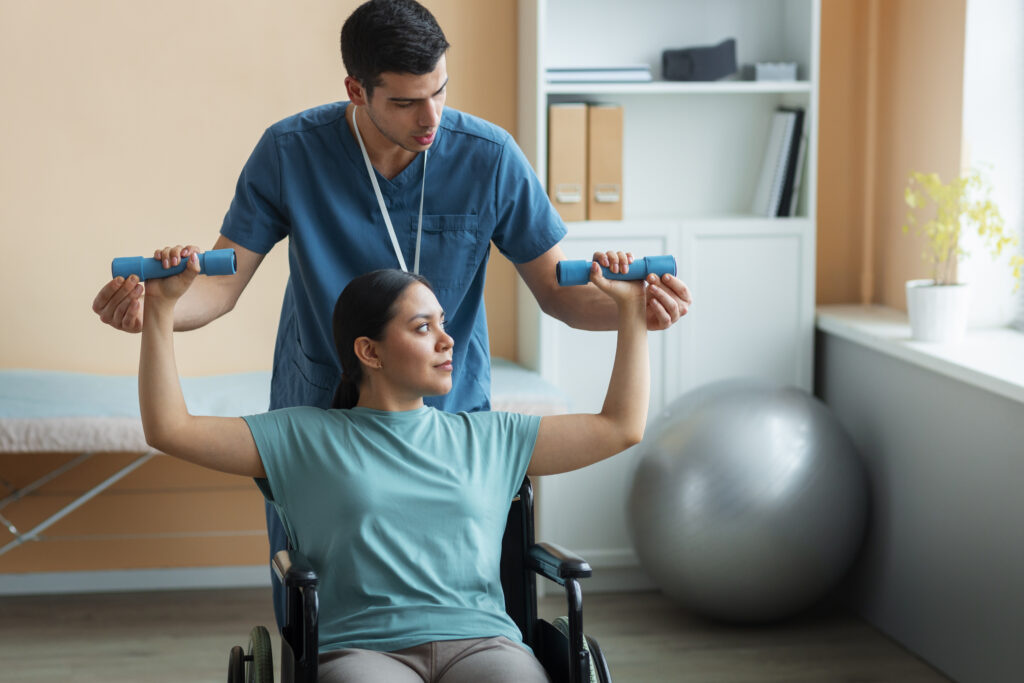
Consultation with a physiotherapist
Before embarking on a home physiotherapy routine, a crucial step is to consult with a physiotherapist. This professional assessment helps identify any underlying issues and guides the development of a personalized exercise plan tailored to your unique needs.
Setting up a dedicated space
Creating a dedicated space in your home for physiotherapy exercises is essential. This could be a corner of a room equipped with a yoga mat, resistance bands, and any other equipment suggested by your physiotherapist.
General Home Physiotherapy Exercises
Neck and shoulder stretches

Commence your home physiotherapy routine with gentle neck and shoulder stretches to release tension and improve flexibility. Simple exercises like neck tilts and shoulder rolls can be done daily to prevent stiffness and enhance overall mobility.
Back strengthening exercises
A strong back is fundamental for overall well-being. Incorporate exercises like bridges and cat-cow stretches to strengthen the muscles supporting your spine, promoting a healthy posture and preventing back pain.
Joint mobility routines
Include joint mobility exercises in your routine to enhance flexibility and reduce the risk of injuries. Ankle circles, knee bends, and wrist stretches are excellent additions to your home physiotherapy regimen.
Targeted Exercises for Specific Conditions
Arthritis-friendly exercises
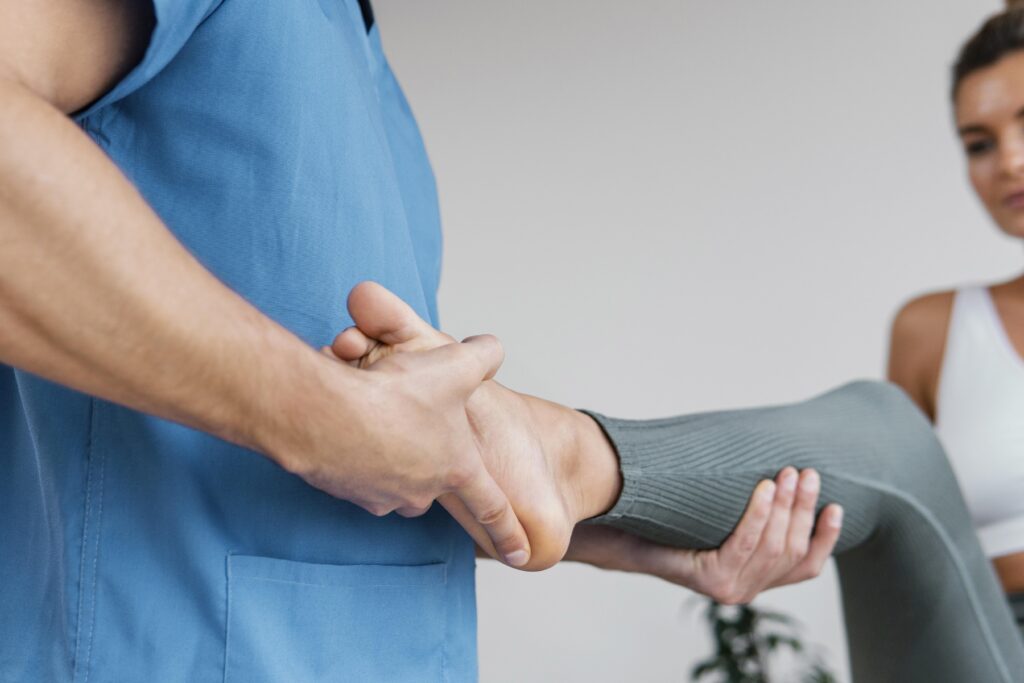
For individuals dealing with arthritis, incorporating low-impact exercises like swimming or cycling can be highly beneficial. Water aerobics and gentle stretching can help manage pain and improve joint function.
Posture improvement exercises
Given the prevalence of desk jobs and sedentary lifestyles, posture improvement exercises are crucial. Integrate exercises such as wall angels and chest stretches into your routine to counteract the negative effects of prolonged sitting.
Balance and stability exercises
Enhance balance and stability with exercises like single-leg stands and heel-to-toe walking. These exercises are particularly valuable for older adults, contributing to fall prevention and overall mobility.
Using Props and Equipment
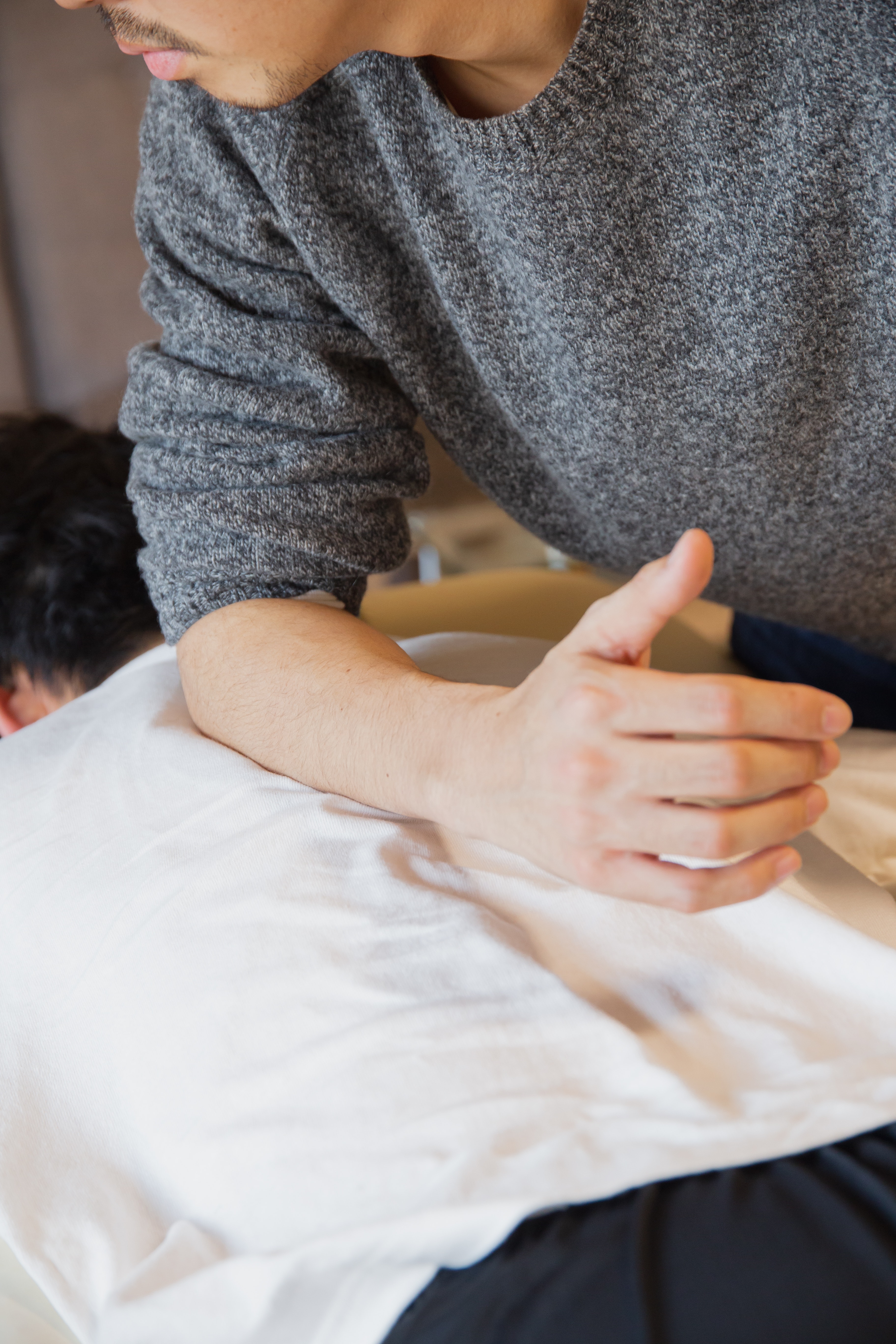
Resistance bands
Incorporate resistance bands into your home physiotherapy routine to add intensity to your exercises. These versatile tools can be used for both upper and lower-body workouts, providing a challenging yet safe workout experience.
Stability balls
Stability balls are excellent for core strengthening exercises. Sitting on a stability ball engages your core muscles, promoting better posture and stability.
Foam rollers
Include foam rollers in your routine for self-myofascial release, helping to reduce muscle tightness and improve flexibility. Rolling exercises can be incorporated into your warm-up and cool-down routines for added benefits.
Tips for a Successful Home Physiotherapy Routine
Consistency is key
The success of your home physiotherapy routine hinges on consistency. Stick to a regular schedule, gradually increasing the intensity of your exercises as your strength improves.
Monitoring progress
Keep a journal to track your progress. Document any improvements or challenges, and share this information with your physiotherapist during follow-up consultations for continued guidance.
Common Mistakes to Avoid

Overexertion
Avoid the pitfall of overexertion, especially if you’re new to physiotherapy. Pushing yourself too hard can lead to injuries and setbacks in your progress, defeating the purpose of your home exercise routine.
Incorrect form
Maintain proper form during exercises to maximize their effectiveness and prevent injuries. If unsure, seek guidance from your physiotherapist, ensuring that you’re performing each exercise correctly.
Real-life Success Stories
Personal testimonials
Explore inspiring personal testimonials from individuals who have experienced positive transformations through home physiotherapy. These stories provide tangible evidence of the benefits of a consistent and personalized approach to home exercise.
Transformation stories
Delve into stories of individuals who have overcome significant health challenges through dedicated home physiotherapy. These narratives highlight the transformative power of targeted exercises and the impact they can have on one’s overall well-being.
Integrating Home Physiotherapy into Daily Life
Incorporating exercises into routines
Make home physiotherapy seamlessly integrated into your daily life by incorporating exercises into existing routines. For example, perform stretches while watching TV or include a short workout in your morning routine for a consistent and sustainable approach.
Making it a family activity
Promote a healthy and supportive environment by engaging your family in home physiotherapy. Turn exercises into enjoyable games or challenges, fostering a sense of togetherness while prioritizing everyone’s well-being.
Benefits of Regular Home Physiotherapy
Improved mobility
Regular home physiotherapy enhances joint flexibility and muscle strength, leading to improved overall mobility. This is particularly beneficial for individuals with chronic conditions or those recovering from injuries.
Pain management
Effectively managing pain is a significant advantage of home physiotherapy. Targeted exercises can alleviate discomfort and contribute to long-term pain relief, providing a natural and holistic approach to pain management.
Overcoming Challenges
Time constraints
Address time constraints by incorporating short, high-intensity workouts into your routine. A focused 20-minute session can be as effective as a longer workout, ensuring that even those with busy schedules can reap the benefits.
Staying motivated
Maintain motivation by setting realistic goals and celebrating small achievements. Consider partnering with a workout buddy or joining online communities for mutual support, creating a positive and encouraging environment.
Expert Tips for Effective Home Physiotherapy
Variability in exercises
Keep your routine dynamic by introducing variety into your exercises. This not only prevents boredom but also ensures that different muscle groups are engaged, contributing to a well-rounded and effective workout.
Gradual progression
Avoid injuries by progressing gradually in your exercises. Start with easier exercises and gradually increase intensity and duration as your fitness level improves, allowing for a sustainable and injury-free journey.
Professional Support in Home Physiotherapy
Virtual physiotherapy sessions
Explore virtual physiotherapy sessions for personalized guidance and support. Many physiotherapists offer online consultations, making it convenient for individuals with busy schedules to receive professional guidance from the comfort of their homes.
Online resources and tutorials
Take advantage of online resources and tutorials for additional guidance in your journey. Many reputable platforms provide step-by-step instructions for various exercises, ensuring that you have access to a wealth of information to enhance your home exercise routine.
Conclusion
Embarking on a home physiotherapy journey can be a transformative experience for your physical well-being. By incorporating targeted exercises, personalized routines, and expert guidance, you can achieve improved mobility, pain management, and overall health. Make a consistent part of your daily routine, and witness the positive changes it brings to your life.
FAQs
- How often should I do home physiotherapy exercises?
- Aim for at least three sessions per week, but the frequency may vary based on your individual needs and goals.
- Can anyone do home physiotherapy exercises, or is it only for people with specific conditions?
- Home physiotherapy exercises are beneficial for individuals of all fitness levels and can be adapted to address specific conditions or goals.
- Do I need special equipment for home physiotherapy?
- While some exercises may require basic equipment like resistance bands or stability balls, many can be done with minimal or no equipment.
- How long does it take to see results from home physiotherapy?
- Results vary, but with consistent effort, many individuals experience positive changes within a few weeks.
- Can home physiotherapy replace traditional physiotherapy sessions?
- While home physiotherapy is effective, it’s essential to consult with a physiotherapist regularly, especially if you have specific health concerns.
- How many physiotherapy sessions will I need?
- The number of sessions required depends on the nature and severity of your condition, as well as your response to treatment. Your physiotherapist will develop a treatment plan tailored to your specific needs and goals.
- Is physiotherapy painful?
- Physiotherapy techniques are generally not painful, although some discomfort may be experienced during certain exercises or manual therapy techniques. Your physiotherapist will work with you to ensure that treatment is comfortable and tolerable.
- Can physiotherapy help with chronic conditions like fibromyalgia or multiple sclerosis?
- Yes, physiotherapy can help manage symptoms and improve the quality of life for individuals with chronic conditions like fibromyalgia, multiple sclerosis, and others. Your physiotherapist will develop a tailored treatment plan to address your specific needs and goals.
- Are there any age restrictions for physiotherapy?
- Physiotherapy is suitable for individuals of all ages, from children to older adults. Whether you’re recovering from an injury, managing a chronic condition, or seeking to improve your overall mobility and function, physiotherapy can benefit people of any age group.
- Can at-home physiotherapy replace professional sessions?
- While at-home physiotherapy is beneficial, periodic consultations with a professional ensure a comprehensive approach, addressing specific concerns.
Dr. Priyanka Bharadwaj (Physiotherapist)
CB Home Physiotherapist: Dr Priyanka Bharadwaj is one of the best female physical therapy experts in Khanpur, Delhi. She offers Physiotherapy at home in Khanpur and nearby areas. With a well-established practice for home physiotherapy, she is an expert in the treatment of conditions such as Back Pain, Neck Pain, Knee Pain, Sciatica, Cervical Spondylosis, Disc Bulge, Frozen Shoulder, Arthritis, Osteoporosis, Muscle Weakness, Balancing Problems… Post-surgery rehab for Shoulder, Knee Surgery / TKR, Hip Replacement … and neurological issues like Stroke, Nerve Injuries, Bell palsy, Multiple Sclerosis, and Parkinson’s. Dr. Priyanka Bharadwaj has an overall experience of 2 Years in various hospitals & clinics.
Her main focus/expertise is in the field of General Physiotherapy but she has trained & worked across multiple specialties like General Physiotherapy, Pediatric Physiotherapy, Geriatric Physiotherapy, Vestibular Rehabilitation, Neurological Physiotherapy, Musculoskeletal Physiotherapy, Cardiovascular Physiotherapy, Pulmonary Physiotherapy, Sports Physiotherapy, Pre and Post Surgery, Rehabilitation, Dry Needling. She has experience working with a wide range of patients from children of small age to senior patients. Dr. Priyanka Bharadwaj is very compassionate and dedicated to patient well-being.
Qualification
Bachelor Of Physiotherapy
Manav Rachna International Institute of Research and Studies
Overall Experience in Years – 2
Connect with Us Online
Social Media:
Stay updated on our services, health tips, and community events by following us on Facebook. Connect with us, and join the conversation on how home care physiotherapy can contribute to a healthier lifestyle.
Online Form:
You can also fill out our online contact form on our website at The Catalyst Physio. Provide us with your details and inquiries, and we will get back to you promptly.
Your Health, Our Priority
At The Catalyst Physio, we prioritize your well-being. Whether you’re recovering from surgery, managing a chronic condition, or seeking preventive care, our dedicated team is committed to providing you with personalized, convenient, and transformative home care physiotherapy.
Contact us today, and let’s embark on the journey to optimal health together. Your well-being is our priority, and we look forward to being part of your path to recovery and sustained wellness.
